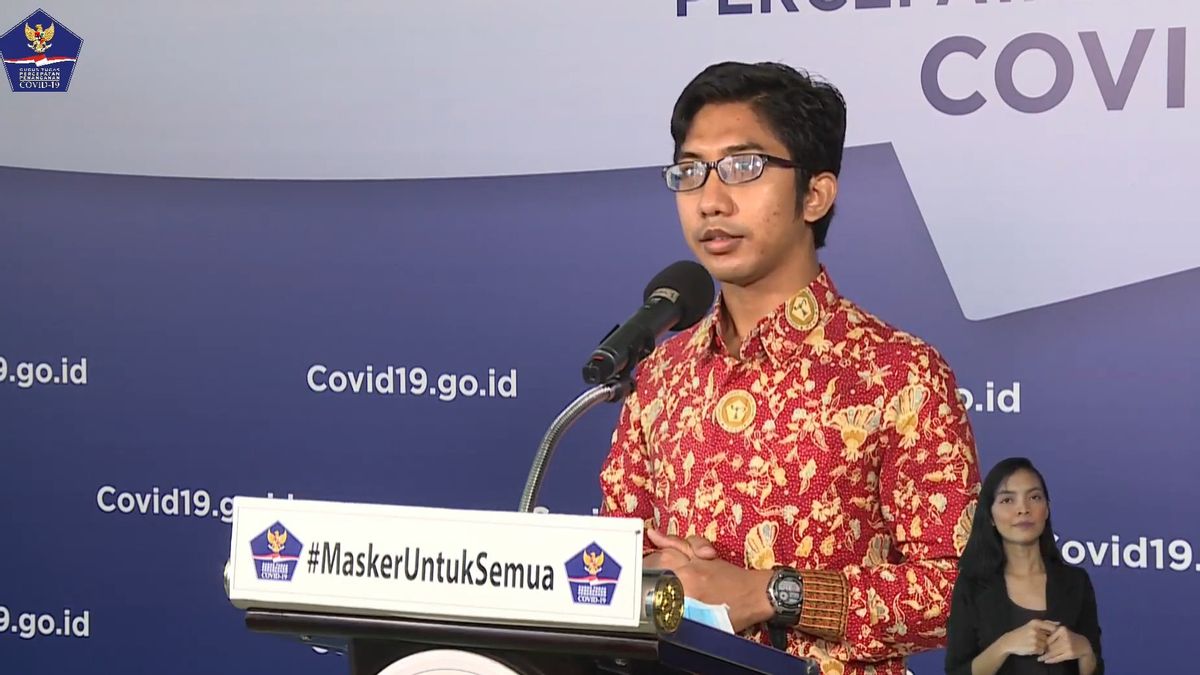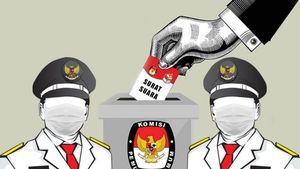JAKARTA - Nurdiansyah, a nurse from RSPI Sulianti Saroso shares stories to the public about her work. He admitted that he was sad to see many of his friends who now had to be infected with COVID-19. Not to mention, the nurses also have to fight the stigma from society because they have to treat patients who are positive for COVID-19.
This bespectacled man said he had worked for 1.5 years at the hospital which is now a COVID-19 referral hospital.
Before this virus entered Indonesia and started infecting many people, Nurdiansyah usually treated HIV / AIDS patients who were receiving treatment at the hospital. So, he was used to treating patients with infectious diseases.
"Suddenly in March, there were cases of COVID-19 in Indonesia. Finally all the rooms in RSPI Sulianti Saroso became COVID-19 rooms. Non-COVID-19 patients are now being transferred to several other hospitals," said Nurdiansyah when telling about the matter. work published on BNPB's official YouTube account, Sunday, April 19.
Before treating an infected patient, the nurses, including himself, had received training first. So, when the plague came, he and his friends were not surprised and could immediately carry out treatment for positive patients.
When treating patients, said Nurdiansyah, the nurses on duty were divided into three shifts. There are morning, afternoon and evening shifts. Before serving, it is a must for them to change clothes. Nurses' clothing, before they treat patients positive for COVID-19, must be covered with personal protective equipment (PPE).
After using complete PPE to avoid transmission of COVID-19, this nurse then entered the room where the patient was being treated.
Nurdiansyah said, one nurse can treat two to three patients with a time ranging from half to one hour or more. Because, he said, it depends on the actions that must be obtained by these patients.
"For example, a patient has an intravenous line, then he has a heart examination or an electrocardiography (EKG). Now this is what we do to the patient. One hour, one patient, the fastest is 30 minutes. This means that when we hold the patient we can be in the room. that's up to three hours more, "he said.
Even so, in practice, he and his friends sometimes have to use PPE longer and have direct contact with his patients. Nurdiansyah admitted that he and his friends never left the patient's room for more than four hours to take care of the patients for whom they were responsible.
This is because Nurdiansyah and his friends are not only responsible for administering drugs or medical treatment. He also has to provide moral support to his patients, especially when the patient is feeling scared or short of breath.
Once upon a time, he said, there was a patient who was afraid when Nurdiansyah would come out of the treatment room so he had to accompany the patient.
When the patient is short of breath, Nurdiansyah and his friends must accompany the patient while teaching deep breathing techniques, so that the patient's breathing returns to normal and is more relaxed.
"So we really motivate the patient. The mentality of the patient, we strengthen it so that ultimately the immunity is strong," he said.
He said, since treating a COVID-19 patient, it had been a month since he had not returned to his home and met his parents. This is because his parents are elderly and have comorbid or congenital diseases.
Against Stigma
With such a tough job, where they have to deal directly with people with COVID-19 with long working hours, nurses must also get stigma from the community regarding their work.
Nurdiansyah said that due to the stigma, a friend of hers then had to be expelled from her rent for fear of being thought to be spreading the virus. Not only for themselves, this stigma is also given by society for their families, even those who are still children.
"There is a friend of mine whose child is isolated from his neighbor's child. So my friend's child is not allowed to play with the neighbor's child," he explained.
Not only stigma, nurses and other medical personnel now have to get treatment and even die from contracting this virus. The transmission to medical personnel from this patient, said Nurdiansyah, could occur as a result of the public's dishonesty in informing their health condition.
"So indeed in these months, we are full of grief. The number of positive friends has been increasing, and the number who has died is a lot," he said.
So, with so much sorrow that the nurses have to accept, Nurdiansyah hopes that the government can pay attention to them. Included in setting working hours and preparing the personal protective equipment (PPE) they need.
As for the community, he advised that prevention should be carried out to avoid this virus. He even said that the community is at the forefront of stopping the spread of COVID-19 in Indonesia. So, all the rules and recommendations that have been made by the government can be implemented obediently by the whole community.
"Prevention is at the forefront of society. We are all nurses, health workers, at the very back of the line when we have to be infected," he said.
Bad Effects of Stigma
Regarding the stigma, some time ago the Chosen Chair of the Indonesian Doctors Association (IDI), Moh Adib Khumaidi, once stated that the stigma was due to panic and excessive concern in the community due to inadequate socialization regarding the corona virus or COVID-19.
The stigma that often ends up discriminating against patients and medical personnel is actually very dangerous. According to Adib, based on research from the World Health Organization (WHO), stigma can have an impact on social isolation and even depression.
"These effects will hinder the patient's self-healing. And it is not impossible, the stigma will lead to dishonesty of patients to medical staff when the patient comes to health services so that the chain of transmission (COVID-19) is getting wider," said Adib to VOI. ago.
Instead of giving a stigma, Adib assessed that the community should provide support for medical personnel who risked themselves. This support is needed so that the enthusiasm continues and they can be ready to work.
Moreover, these medical personnel need adequate rest after they are on duty and are on guard at the hospital continuously. Community refusal when they returned home after work, forced medical personnel to return to the hospital and stay there.
"This is very risky for the quality of their own health," he concluded.
The English, Chinese, Japanese, Arabic, and French versions are automatically generated by the AI. So there may still be inaccuracies in translating, please always see Indonesian as our main language. (system supported by DigitalSiber.id)













